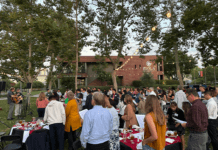That doesn’t mean that differences don’t matter. Among Evangelicals, as well as non-Evangelical Christians, there are significant differences as to what the gospel even is, as well as how (or whether) it is to be shared with unbelievers. There are some times when our convictions require that we adjust how we work together.
Being ecumenical doesn’t require us to shed our doctrinal differences. Instead, it means that we approach the ecumenical table looking to identify where we can work together rather than looking for reasons why we can’t. Sometimes, our differences require us to change how we work, but this shouldn’t prevent us from seeking ways to share the gospel together.
Our Witness
As an Evangelical ecumenist, I hold firmly to the belief that our unity serves to enhance our witness to an onlooking world. Jesus Himself alludes to this in His priestly prayer in John 17—that as we are one with one another and one in Him, the world will recognize the testimony of Jesus (17:21-23).
As is often said, unity doesn’t require uniformity. We can be tightly bonded together in love and still retain our distinctions. In a world which is becoming increasingly polarized over ideological issues, the Church’s ability to hold deeply held differences together with unity is a witness of the power of the gospel. It is also a model for the world to follow.
Church Planting
Another area where we can foster ecumenical cooperation is in the area of church planting. I’m not necessarily suggesting that churches of different traditions logistically plant local churches together. I’ve learned that at the local level, planting churches is best left to a single denomination per church, even while mutual learning and encouragement for church planters works quite well together. However, denominations hold different beliefs on essential things that are part of the church community. For example, baptism to Presbyterians can involve babies and sprinkling, but baptism to Baptists means immersion following conversion.
To use another example, while planting a church, the priests of the ACNA will explain that there are three offices—the bishop, priest, and deacon. I, on the other hand, will teach my new converts and attendees that there are two—pastors/elders and deacons. That can create some issues in terms of governance and ecclesiology.
On the other side of eternity, we’ll find out that all of us are probably wrong in at least one of our theological affirmations. But, for now, there are just too many important theological beliefs in each denomination that, at a micro level, would make interdenominational church planting too difficult to retain the centrality of the mission—to become disciples who make disciples until our world knows Jesus.
But there are many ways to work together in church planting at a macro level that still forge ecumenical bonds. For example, Daniel Yang and I partnered with several other groups to create the Chicagoland Church Planting Alliance, which meets quarterly to talk about church planting, guiding and facilitating conversation for church planters. At these meetings, we gather planters and leaders from different denominations to pray together, train together, and learn from one another.
Although we are from different theological traditions, we come together because of our common passion to see more churches planted for the sake of the gospel. It’s fun, and there is much to be learned as we work together, as “iron sharpens iron.” We learn from each other and then take that back to our local churches, denominations, and church planting networks.
Concluding Thoughts
Evangelical ecumenism is ultimately about learning to find agreement where suspicion or hostility once existed. Since we share a common view of the gospel, that can (and should) involve common prayer and evangelism strategies. It might involve learning about church planting together. And, it certainly involves cultivating agreement on issues like the sanctity of life, advocating for justice, and protecting victims. This is good and helpful to our witness and the growth of the kingdom! Let’s do this more and more.
There’s an Evangelical ecumenism that values our doctrinal differences and takes them seriously, and still acknowledges our common bonds in Christ and our common mission to reach the world with the gospel.











